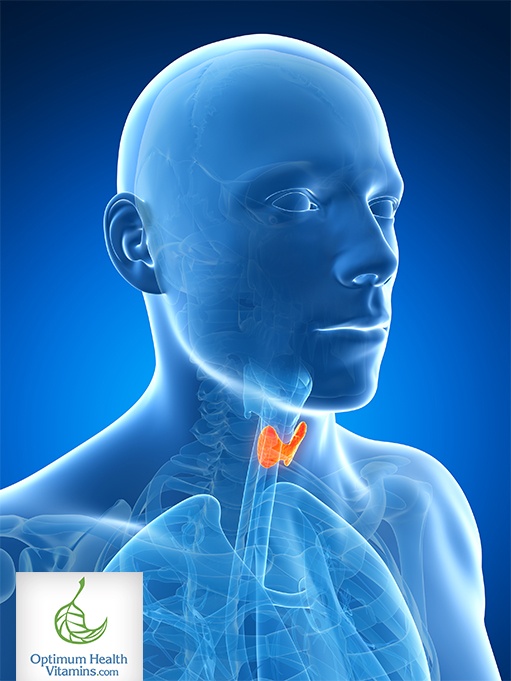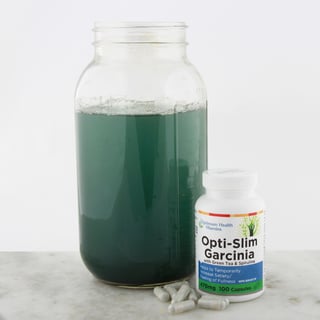
Many may wonder why low thyroid status is becoming epidemic and how healthy thyroid function can be acheived.
Well, consider what we are exposed to: stress, imbalanced blood sugar and insulin, intestinal dysbiosis (the wrong bugs in your gut), allergies/ immune responses, and high toxicity/ poor detoxification, etc. And what do they all have in common?...Inflammation!
Excess inflammation puts our physiology into a state of alarm. And what does your body do to protect you? It shuts down your metabolism to conserve energy, and ward-off what our genes still think is our biggest threat to survival, i.e. starvation. Yet, today’s problem for many is too much food, not too little. So while we are being "protected", we pack on the pounds.
The basic thyroid hormones are designated T4 and T3. When the brain senses these hormones are low, it releases Thyroid Stimulating Hormone, or TSH, (what your Dr. measures) to tell the thyroid to make more...particularly T4 or Thyroxine, which requires among other nutrients, the mineral iodine, and the amino acid tyrosine.
T4 is then converted, mostly in the liver and kidney to T3 or triiodothyronine, and some conversion happens in the target cells themselves. T3 is approximately four times as active as T4, and T3 is directly involved in the functioning of our energy producing cellular furnaces called mitochondria. Think of T3 as somewhat of a throttle for your metabolism, i.e. in general, the more T3 you produce the faster your metabolism will be.
But when we are under stress, and our body is trying to conserve energy, one of the tricks it uses is to produce much more of what is called reverse T3, or rT3. You can think of this as needing a right hand glove to perform a task normally, but all of a sudden, you are given a bunch of left hand gloves. You can put them on, but they slow everything down, dramatically. Likewise, when the body produces a lot more rT3, it puts the brakes on our metabolism.
So regardless of whether you are: A. simply not producing enough T4 - for example, due to an iodine deficiency, or B. you are not converting enough T4 to T3, which a deficiency of the mineral selenium can cause, or C. you are over-producing reverse T3 to conserve energy, the result is the same. You will suffer the signs and symptoms of low thyroid that many of us know all too well, such as chronically cold hands and feet, weight gain, sluggishness, dry brittle hair that is falling out, depression, and on the list goes.
To do something about it consider the following. (Remember that whereas nutrient deficiencies are normally corrected over time, balancing out your adrenals and blood sugar can have an impact within hours or minutes! One of the fastest things you can do to get your thyroid gland out of hibernation is to reduce inflammation):
1. Basic nutrition for the thyroid. This includes iodine, zinc, magnesium, iron, selenium. B-vitamins, and the amino acid L-Tyrosine. There are several supplement formulations available that address many of these simultaneously. Whereas iodine and L-Tyrosine are central to T4 production, some argue that these deficiencies are uncommon. Yet others argue that iodine deficiency is rampant. The iodine supplement I prefer is Io-Med by Alterra. Just one a day will generally suffice. And if you are vegetarian, tyrosine deficiency is more likely. One unrealized benefit of tyrosine supplementation for thyroid is that it raises the alerting neurotransmitters dopamine and norepinephrine, which can have powerful anti-inflammatory effects.
2. Address your adrenal function. One of the fastest ways to positively affect thyroid function is to ensure good adrenal response to offset the stress, inflammation, and oxidation that often affected the thyroid to begin with. My favourite for this is the adaptogenic herb Rhodiola.
Ashwagandha is another botanical that has demonstrated a positive benefit for the thyroid. Both Aswagandha and Rhodiola can be found in Optimum Health's Adrenal Balance formula along with Holy Basil and Ginseng. The B-Complex vitamins and Vitamin C also play significant roles in adrenal gland function.
3. Address blood sugar balance and insulin levels.
Hypoglycemia or low blood sugar can be a direct trigger for our stress response, as our bodies sense that it is time to conserve energy, and start producing reverse T3. (This is partly why so many diets involving calorie-restriction fail to produce weight loss.)
On the other hand, high blood sugar and high insulin can both be very inflammatory!
One of the absolutely quickest ways I have found to balance blood-sugar is using Garcinia cambogia which prevents conversion of blood-sugar to fat, and instead re-routes it to the liver and muscles, where it is stored as glycogen. In turn, glycogen is our most immediate form of storage energy, so if our blood sugar drops, it is right there to bring it back up. In doing so it also keeps us feeling satiated, reducing appetite and cravings, particularly for carbohydrates due to Garcinia's ability to raise serotonin.
The biggest problem with Garcinia is remembering to take it regularly. Recently my wife came across a good idea for this, which we tried, with good results. And that is to take an approximately 2-litre jar of water, slice up some organic lemons, oranges and/or limes in it, and let it sit in the fridge for a bit....even 10 minutes will suffice, though longer is better. Then squish the citrus a bit as you remove it from the water, and empty 6-9 capsules of Opti-Slim Garcinia into the water. Stir, and consume this through the day. The added spirulina in this formula, besides turning the water a vibrant turquoise colour, also helps balance blood sugar, along with green tea to gently nudge your metabolism. The citrus adds a pleasant flavour


Related article: GlucoTrim & OptiSlim - Blood Sugar & Weight Management Supplements.
4. Don't forget your essential fats! Omega-3's in particular are not only anti-inflammatory, but they keep your cell membranes fluid, and your receptor sensitivity up, so your cells can receive the hormonal messages properly. (Just like insulin, we can become resistant to the messages from thyroid hormones as well!)
5. Support your liver function and glutathione levels! The liver is the central processing plant to get rid of toxins that can suppress our thyroid function. One of the liver's hugely important detox and antioxidant molecules is glutathione. Studies have shown that glutathione is also important for supporting conversion of T4 to T3, which accelerates metabolism! To address both issues, I highly recommend Optimum Health's Opti-Liv Extra, which not only provides broad spectrum liver support, but also increases glutathione production. As well, this product contains selenium (discussed above) to help with thyroid hormone conversion.
6. Consider gut inflammation, food allergies and probiotics! In the body the "seat of inflammation" is in the gut. Not only is 70-80% of your immune tissue located there, your gut is also home to a vast array of bacteria and other microbes. If the wrong bugs are dominant in your gut, or if you are having immune responses to the foods you are eating, or both, the outcome is inflammation. This will drag your energy and thyroid function right down! So if nothing else, remember the far-reaching benefits probiotics!
7. EXERCISE! The thyroid's effects on your mitochondria and metabolism are a two-way street. As your thyroid function improves, your oxygen consumption increases with heightened mitochondrial activity. Yet the opposite is also true, i.e. as you exercise, and you strengthen mitochondrial function, it positively impacts all aspects of hormone sensitivity, including thyroid function. But this is another whole discussion in itself! So, until next time...
Be Well!
John

- Kelly, G.: Periheral Metabolism of Thyroid Hormones: A Review. Alternative Medicine Review; Vol 5, No. 4; August 2000; pp. 306-333.
Stefano Mariotti MD: Physiology of the Hypothalamic-Pituitary Thyroidal System. Endotext[Internet] updated June 1, 2011. http://www.ncbi.nlm.nih.gov/books/NBK278958/-
http://www.stopthethyroidmadness.com/reverse-t3/
http://chriskresser.com/inflammation-strikes-again/- Moustafa SA: Effect of glutathione (GSH) depletion on the serum levels of Triiodothyronine (T3), Thyroxine T4, and T3/T4 ratio in allyl alcohol-treated male rats and possible protection with zinc. Int J Toxicol 2001 Jan-Feb;20(1):15-20.
- Imai Y, Kataoka K, Nishikimi M: A possible function of thiols, including glutathione, as cofactors in the conversion of thyroxine to 3,3',5-triiodothyronine in rat liver microsomes. Endocrinology Jpn. 1980 Apr;27(2):201-7.
Disclaimer: The above information is provided for informational purposes only and is not intended to replace the advice of your physician.


